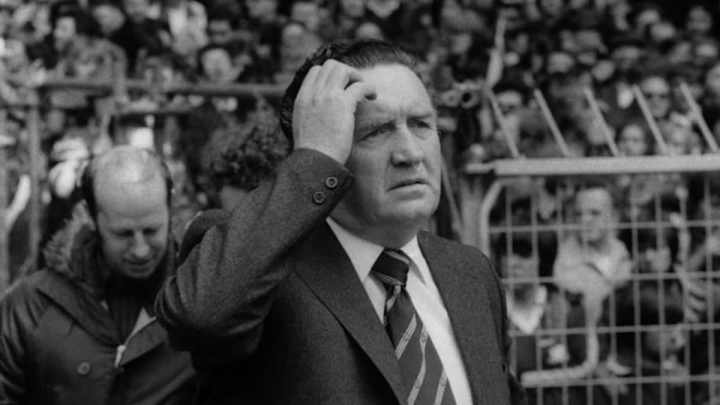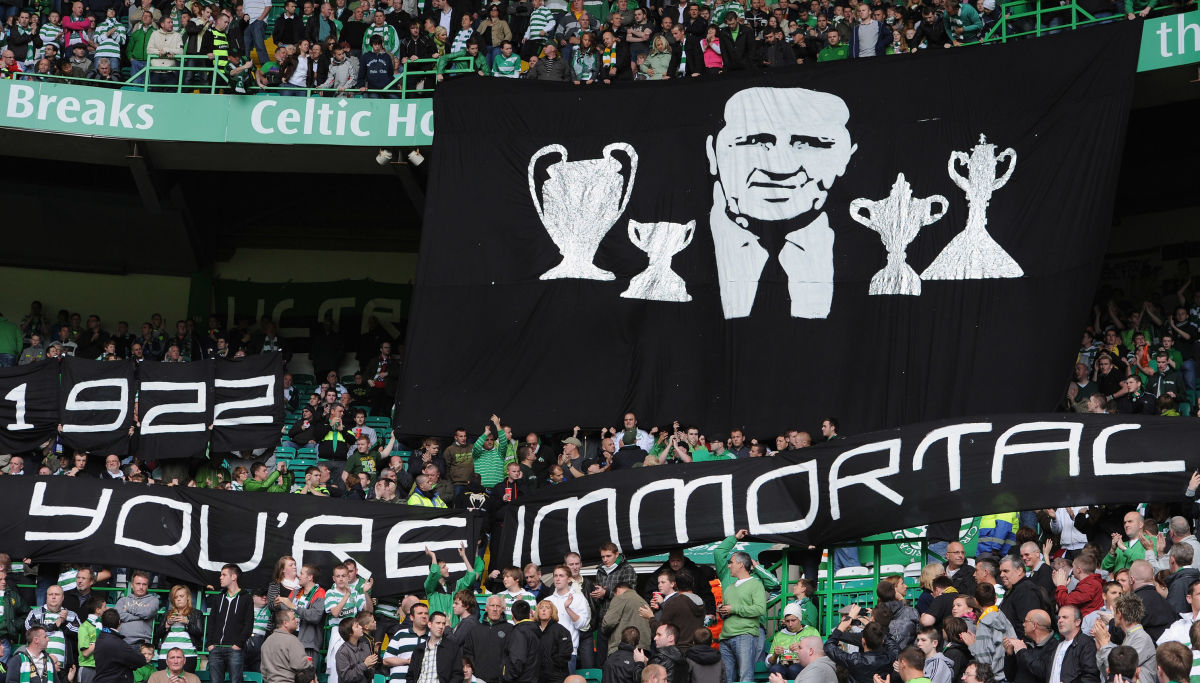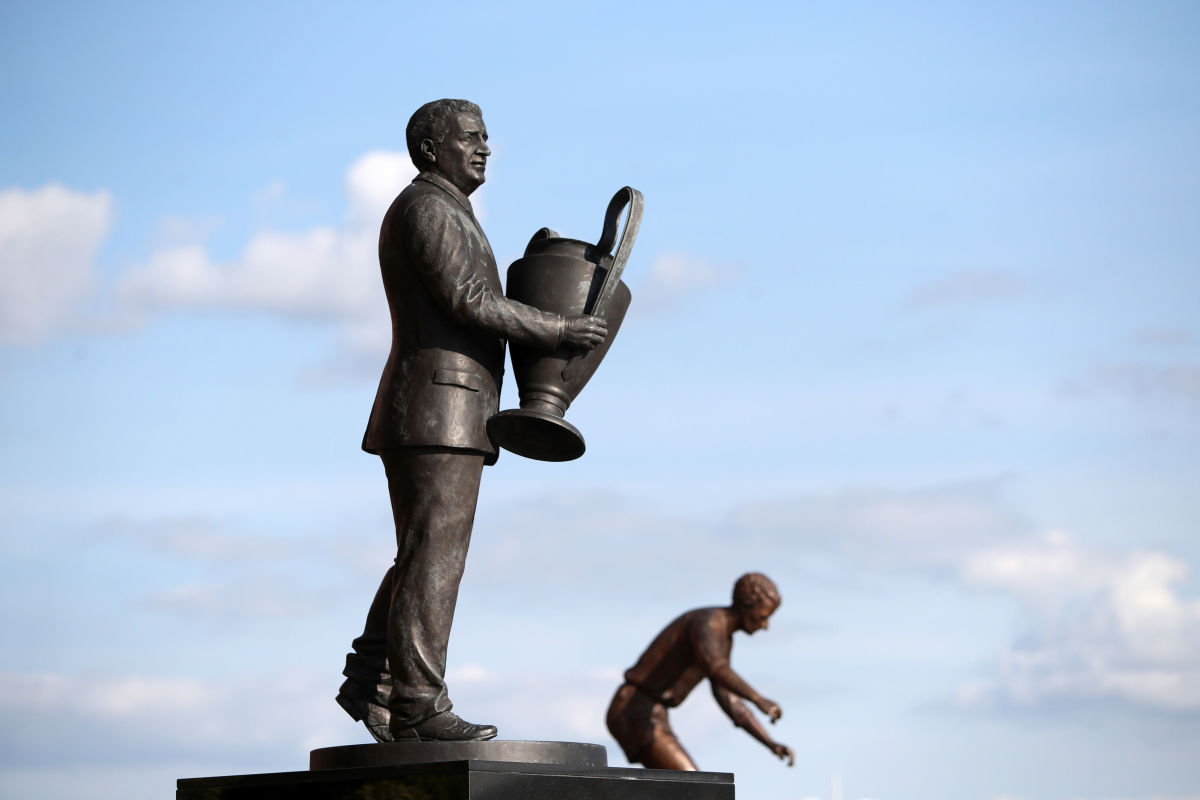Jock Stein: The Man Who Guided Celtic to Historic Heights & Mentored Sir Alex Ferguson

Jock Stein is number 28 in 90min's Top 50 Great Managers of All Time series. Follow the rest of the series over the course of the next six weeks.
You can knock the standard of Scottish football all day long, if that's what you like. The small, sparsely populated nation at the point of Britain doesn't have the means to compete at the height of the current footballing climate, either at club or international level.
What it does have, however, is a storied history of working class people and values that has bled into everything of note it has produced over the years. And through that, it has certainly produced more than its fair share of influential football figures.
There are more famous, more prominent names to come later in this list who fall into the same category. But no-one who worked or played under Jock Stein would even think to argue against him being the greatest thing to ever come from Scottish sport.

His story starts in the murky coal mines of Lanarkshire back in the 1930s. Jock, a 15-year-old fresh out of school, then had no idea of the career that would follow. He didn't know that he'd win nine league championships and a European cup with Celtic, nor that he'd manage his country and help to mould some of the greatest managers in the world, while conquering others and becoming one himself.
He had not even the slightest inkling, in fact, that he would even have a professional career in the sport. He was an ordinary, working class Scot, learning the lessons in humility for which his undiscovered genius would become an undercurrent in forging one of the greatest minds in sport.
It stayed with him throughout an ordinary playing career and in his early days as a coach, after an ankle injury forced him into an early retirement. A playing career that saw him feature for Blantyre Victoria, Albion Rovers, Llanelli Town and then Celtic - then a long way from the side that would come to dominate in the years that followed - was brought to an end, as he moved into management with the Hoops' reserve side.
"The best place to defend is in the opposition penalty box."
Jock Stein
His promise as a coach became clear immediately, with the likes of Billy McNeil and John Clark - who would later become fixtures in the first team - benefiting greatly from the simplistic innovation Stein brought to the table.
The shackles of reserve management were kept on for just three years, before Stein moved into the senior game when it became clear Celtic wouldn't immediately hand him the reins - although the next five years would change their minds.
Spells with Dunfermline and Hibs, featuring some of the most exciting, attacking football in the country, turned the fortunes of both clubs around. The former went from relegation shoe-ins to Scottish Cup winners, while the latter were reinstated as one of Scottish football's major forces, before Big Jock was tabled with an offer he couldn't refuse.
Career Honours |
|---|
Scottish Cup x8 (1960/61, 1964/65, 1966/67, 1968/69, 1969/70,1970/71, 1971/72, 1972/73/ 1973/74, 1976/77) |
Scottish League Championship x10 (1965/66, 1966/67, 1967/68, 1968/69, 1969/70, 1970/71, 1971/72, 1972/73, 1973/74, 1976/77) |
Scottish League Cup x6 (1965/66, 1966/67, 1967/68, 1968/69, 1969/70, 1974/75) |
European Cup (1966/67) |
Celtic eventually came calling, and while transformation jobs were becoming his speciality, it's difficult to imagine the size of the turnaround the club underwent in his tenure. Taking over a side who hadn't won the league or the Scottish Cup since 1954, within a year they had reclaimed both.
This wasn't due to a player overhaul either. He made just two major signings in his first two seasons - Joe McBride from Motherwell and Willie Wallace from Hearts - but managed to change the mentality of the squad completely by instilling them with the confidence that the could win everything if they took the shackles off and focused on entertaining the fans.
And win everything they did. What had been an average Scottish team two years previously became the champions of Europe, as the famous Lisbon Lions - consisting entirely of players born within 30 miles of Parkhead - conquered Inter, to become the first British side to win the famous trophy.

It would be the only European honour Stein would win as manager, but ten league titles followed in 13 years alongside eight Scottish Cups, before he stepped down in 1978.
A brief spell with Leeds - lasting just 45 days - preceded his appointment as Ally McLeod's replacement in the Scotland dug-out, where he would recruit Aberdeen boss Alex Ferguson to work as his assistant on a part-time basis.
Teams Managed | Years |
|---|---|
Dunfermline | 1960-64 |
Hibernian | 1964-65 |
Celtic | 1965-78 |
Leeds United | 1978 |
Scotland | 1978-86 |
Ferguson attributes so much of his legendary success as a manager to the wisdom he picked up from Stein, both directly and by osmosis, in the eight years that would follow. He has told stories of the advice that would lead to Aberdeen's European Cup victory over Alfredo di Stefano's Real Madrid 1983, that would ultimately land him the Manchester United job three years later.
His famous rage - branded 'the hairdryer treatment' - would also stem from something Stein told him that year: "there's nothing wrong with losing your temper for the right reasons."
Tragically, Big Jock's story ended in 1986, before he could lead Scotland into a second successive World Cup, as he finally lost his battle to the longstanding heart issues that had so frequently troubled him in his later years.
Two of the greatest managers ever in my opinion, Jock Stein & Sir Alex Ferguson, so similar in their managerial style pic.twitter.com/5KRg2fweXq
— Lou Macari (@LouMacari10) October 9, 2014
His story is a legendary one, but his influence is perhaps best summarised by Ferguson, whose own legacy is so deeply embedded in that of the Lisbon Lion himself.
"I am proud to say that I new Jock as a manager, as a colleague, and as a friend. He was the greatest manager in British football. Men like Jock will live forever in the memory."
Number 50: Marcelo Bielsa - El Loco's Journey From Argentina to Footballing Immortality in Europe
Number 49: Vic Buckingham - How an Englishman Discovered Johan Cruyff & Pioneered Total Football
Number 48: Claudio Ranieri: A Ridiculed Tinkerman Who Masterminded One of Football's Greatest Ever Achievements
Number 47: Bill Nicholson: Mr Tottenham Hotspur, the First Double Winning Manager of the 20th Century
Number 46: Sven-Goran Eriksson: The Scudetto Winning Shagger Who Never Solved the Lampard-Gerrard Conundrum
Number 45: Sir Alf Ramsey: The Man Behind the 'Wingless Wonders' & England's Sole World Cup Triumph
Number 44: Antonio Conte: An Astute Tactician Whose Perfectionist Philosophy Reinvented the 3-5-2 Wheel
Number 43: Kenny Dalglish: The Beacon of Light in Liverpool's Darkest Hour
Number 42: Massimiliano Allegri: The Masterful Tactician Who Won Serie A Five Times in a Row
Number 41: Sir Bobby Robson: A Footballing Colossus Whose Fighting Spirit Ensured an Immortal Legacy
Number 40: Luis Aragones: Spain's Most Important Manager, the Atleti Rock and the Modern Father of Tiki-Taka
Number 39: Herbert Chapman: One of Football's Great Innovators & Mastermind Behind the 'W-M' Formation
Number 38: Carlos Alberto Parreira: The International Specialist Who Never Shied Away From a Challenge
Number 37: Franz Beckenbauer: The German Giant Whose Playing Career Overshadowed His Managerial Genius
Number 36: Viktor Maslov: Soviet Pioneer of the 4-4-2 & the Innovator of Pressing
Number 35: Rafa Benitez: The Conquerer of La Liga Who Masterminded That Comeback in Istanbul
Number 34: Zinedine Zidane: Cataloguing the Frenchman's Transition From Midfield Magician to Managerial Maestro
Number 33: Luiz Felipe Scolari: How the Enigmatic 'Big Phil' Succeeded as Much as He Failed on the Big Stage
Number 32: Jupp Heynckes: The Legendary Manager Who Masterminded 'the Greatest Bayern Side Ever'
Number 31: Vicente del Bosque: The Unluckiest Manager in the World Who Led Spain to Immortality
Number 30: Arsene Wenger: A Pioneering Who Became Invincible at Arsenal
Number 29: Udo Lattek: The Bundesliga Icon Who Shattered European Records
